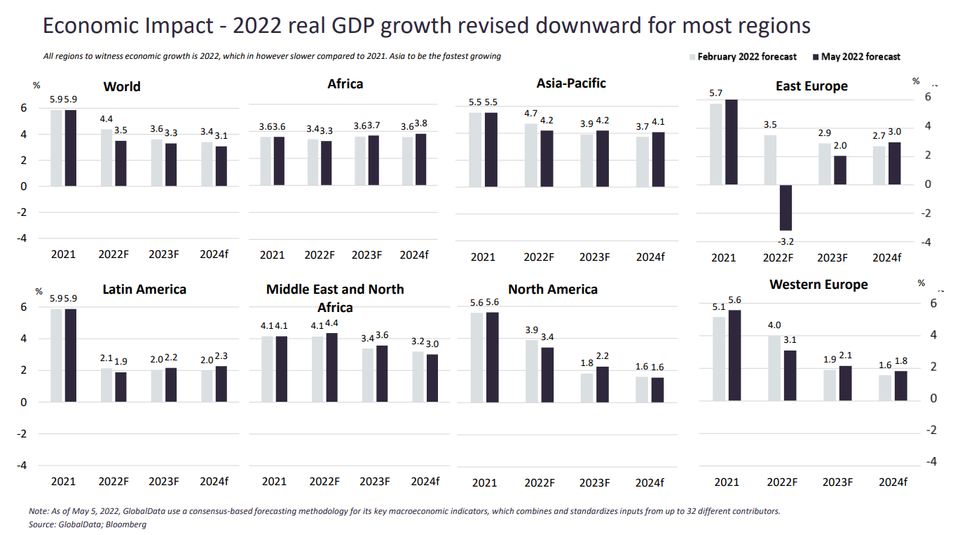Ukraine crisis briefing
Powered by
Download GlobalData’s Ukraine Crisis Executive Briefing report
- ECONOMIC IMPACT -
Latest update: 6 May
GlobalData forecasts that the world economy will grow at a slower pace of 3.5% in 2022 following a 5.9% growth in 2021. On the other hand, the global inflation rate is projected to rise to 6.5% in 2022 from 3.5% in the previous year due to supply chain disruption amid the Ukraine-Russia war.
The GCC nations are forecast to grow at their fastest pace in years on higher hydrocarbon prices. Among the six GCC nations Saudi Arabia is projected to be the fastest growing with real GDP forecast at 5.6% in 2022, followed by Kuwait (4.9%), Qatar (4.4%), the UAE (4.4%), Bahrain (2.7%) and Oman (2.7%).

- SECTOR IMPACT: TRAVEL AND TOURISM -
Latest update: 6 May
Revenue impact
Wizz Air slashed its growth target in March after stopping the sale of flights to and from Russia and Ukraine as the conflict between the two countries continues. Wizz Air is the only EU carrier to have a base in Ukraine.
The company’s four aircraft stationed there will be withdrawn pending a “safe evacuation window” for them. It previously operated 45 routes out of Ukraine and was the second-largest budget airline in the country with a 27% market share, according to the company’s 2021 annual report.
In late April, Eurocontrol, the European organisation for the safety of air navigation, noted that oil had spiked to $152 a barrel due to Russia’s invasion of Ukraine. The organization stated that many airlines were not viable with oil at $100 a barrel.
Airlines that have not hedged their fuel needs could end up in a precarious situation. Increased fuel costs mean higher ticket prices for travellers, which could deter many price-sensitive consumers from flying.
Travel enters a new era
Low tourist demand means many cars rental companies have been forced to sell their fleets in order to stay afloat during the Covid-19 pandemic.
Markets in which airport pickup is the largest channel, such as the US, have particularly suffered, but the effect has been felt all over the world.
But as demand picks up, with more people traveling and supply still down, major price hikes are likely to be in store for anyone who wants to rent a car.
Key Travel And Tourism developments
SANCTIONS
Many non-Russian airlines are having to take diversions to avoid flying through Russian airspace. Closed airspace translates to longer flight times, increased fuel usage, more pilot hours, higher costs, and consequently higher fares. Higher fares could further impact the recovery of many airlines with global operations.
The sanctions implemented since the attack have left Russia isolated. Iits airlines are still unable to fly to much of the world and is barred from receiving new planes.
Turkey is taking advantage of the travel sanctions implemented by the EU. As Russian tourists stopped flying to Greece, Turkish Airlines made the decision to divert the lucrative Russian source market to Turkey. In early April, Turkish Airlines signed an agreement to bring 1.5 million Russian tourists to Turkey in 2022.
DEMAND DISRUPTION
Travel enters a new era
Low tourist demand means many cars rental companies have been forced to sell their fleets in order to stay afloat during the Covid-19 pandemic.
Markets in which airport pickup is the largest channel, such as the US, have particularly suffered, but the effect has been felt all over the world.
But as demand picks up, with more people traveling and supply still down, major price hikes are likely to be in store for anyone who wants to rent a car.
Ukraine and Russia are important source markets for Turkey. In 2021, they created a combined 4.9 million visits to Turkey, which was 36% of the total visits from its top 10 inbound source markets. Turkey will be heavily impacted by the crisis.
Italy and Cyprus have proven to be popular destinations for Russian tourists. However, with the EU banning Russian aircraft from operating in its airspace, these nations will be receiving hardly any Russian tourists this summer. Both countries were in the top five in terms of most visited nations by Russians in 2021, meaning they will likely feel the economic pinch of a fall in Russian visitation.